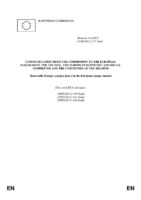| dc.description.abstract | Renewable energy enables us to diversify our energy supply. This increases our security of supply and improves European competitiveness creating new industries, jobs, economic growth and export opportunities, whilst also reducing our greenhouse gas emissions. Strong renewables growth to 2030 could generate over 3 million jobs1, including in small and medium sized enterprises. Maintaining Europe's leadership in renewable energy will also increase our global competitiveness, as "clean tech" industries become increasingly important around the world. In 2007 the European Union set the ambitious goal of achieving a 20% share of renewable energy and a 10% share of renewable energy in transport by 2020 and has flanked these objectives by a series of supporting policies2. The renewable energy goal is a headline target of the Europe 2020 strategy for smart, sustainable and inclusive growth. At the start of 2012, these policies are beginning to work and the EU is currently on track to achieve its goals3 (see Chapter 1 of Staff Working Document). However, the economic crisis has made investors cautious about the energy sector. In Europe's liberalised energy markets, the growth of renewable energy depends on private sector investment, which in turn relies on the stability of renewable energy policy. Investment in infrastructure, manufacturing and logistics also requires related investment - in testing facilities, cable production, factories and ships to build offshore wind installations. In parallel to a rigorous implementation and enforcement of the Renewable Energy Directive4, clarity on longer term policy is needed to ensure that the necessary investment is made. |

